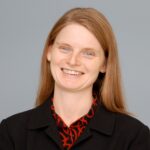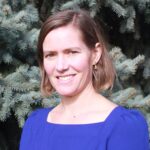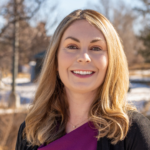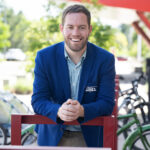Main Conference Page | Registration | Preconference | SIRC Cup | Program | Awards | Sponsorships | Presenter Guidelines | Hotel
 Dr. Kim DuMont
Dr. Kim DuMont
The social side of research use: What else is needed, and where do we go from here?
Implementation science assumes that if research-informed programs, practices, and tools are used by organizational leaders and practitioners, services and outcomes will improve. This talk explores the social side of research use and discusses other conditions that are needed for findings from implementation science to realize its potential
Kim DuMont is Senior Vice President of Program with the William T. Grant Foundation. She is interested in how research along with other types of evidence can be used to address longstanding racial and economic inequities to better support communities. From 2011 to 2020, Kim was Program Officer and then Senior Program Officer at the Foundation and was instrumental in reshaping the Foundation’s focus on the use of research evidence, launching their focus on reducing inequality, and developing and implementing the Institutional Challenge Grant program. Before returning to the Foundation as Senior Vice President of Program in 2022, Kim was Vice President and the inaugural Managing Director of the Equity Initiative at the American Institutes for Research and as a member of AIR’s Executive Leadership Team. She previously worked as a research scientist at New York State Office of Children and Family Services, where she evaluated programs to better serve families throughout New York State.
 Dr. Annette Boaz
Dr. Annette Boaz
A movable feast: working at the boundary to support the implementation of science into policy and practice.
Having spent more than 20 years studying the use of research in policy and practice, in 2019 Annette Boaz was seconded to the UK Government Office for Science. While in government she was involved in supporting government in building connections with the Academy and with science funders and in the mobilisation of existing research to support the COVID recovery. In her keynote she will draw on this recent experience and her research to reflect on the implementation of science into practice, the use of science in policy and the connections between the two.
Annette Boaz is Professor of Health and Social Care and Director of the UK NIHR Health and Social Care Workforce Research Unit at King’s College London. She has more than 25 years of experience in supporting the use of evidence across a range of policy domains. She was part of one of the largest UK investments in the evidence use landscape, the ESRC Centre for Evidence Based Policy and Practice and was a Founding Editor of the Journal Evidence & Policy. She has undertaken an international leadership role in promoting the use of evidence, recently publishing a new book on evidence use ‘What Works Now’ and coleading Transforming Evidence with Kathryn Oliver. She is a member of the WHO European Advisory Committee on Health Research and advises WHO on a number of international projects. She has recently completed a fellowship based in the UK Government Office for Science.
 Dr. Rohit Ramaswamy
Dr. Rohit Ramaswamy
Developing scientist practitioners in global settings: Building implementation science capacity in Low and Middle Income Countries
As global interest in implementation science continues to grow, there is a continuing need to building the capacity of researchers, practitioners and decision makers in low and middle income countries (LMICs) to develop, enhance and adapt the principles of the science to improve the quality of implementation in their settings. Academic and non-academic training programs in implementation science in LMICs are steadily increasing. However, there is still a shortage of trained professionals can apply scientifically rigorous but locally relevant frameworks and tools and also inadequate demand from policy and decision makers for greater implementation science capability. There is a need for a critical examination of current capacity building efforts and for the generation of new ideas to enhance the spread and effectiveness of capacity building efforts. Using examples from capacity building models to train professionals to improve the implementation of HIV programs in Africa, this talk will explore pedagogies and delivery methods to improve the reach and effectiveness of implementation science capacity building in LMIC settings.
Dr. Rohit Ramaswamy is a Professor of Pediatrics at the James M. Anderson Center for Health Systems Excellence. Prior to joining Cincinnati Children’s, he was the Associate Director of the Public Health Leadership Program and a Professor in Maternal and Child Health at the Gillings School of Global Public Health at the University of North Carolina at Chapel Hill. Dr. Ramaswamy’s area of expertise is in Implementation and Improvement science, which deals with the development and evaluation of systematic methods and tools to sustainably implement and improve complex interventions. His work blends the tools of systems science, design thinking, implementation science and continuous quality improvement to build capacity for implementation. His global projects include the improvement of clinical and operational processes in tertiary maternity hospitals in Ghana, integrating mental health service delivery into the district primary health care system in India. His has developed and taught Implementation Science programs in South Africa and in Zambia. In the US, he has led the development of innovative methods to evaluate complex community transformation initiatives. Dr. Ramaswamy has a Bachelor of Technology degree in Mechanical Engineering from the Indian Institute of Technology, MS and PhD degrees in Civil Engineering from the Massachusetts Institute of Technology, a MPH degree from the University of North Carolina at Chapel Hill and a Graduate Diploma in Biostatistics from the University of Sydney.
Implementation Science in Colorado: A panel using the Translational Science Benefits Model to describe impact.
 Panelist: Amy G. Huebschmann, MD, MSc, FACP, FSBM
Panelist: Amy G. Huebschmann, MD, MSc, FACP, FSBM
Dr. Huebschmann is a primary care physician and Professor at the University of Colorado School of Medicine in the Division of General Internal Medicine. Dr. Huebschmann’s independent line of research inquiry seeks to advance the dissemination and implementation (D&I) science methods available to translate evidence-based interventions into real-world practice settings with attention to health equity concerns. The goal of this work is to improve the treatment and prevention of chronic diseases, including diabetes, asthma, and cancer. Dr. Huebschmann currently serves as MPI and lead D&I investigator for one of only 7 NHLBI-funded UG3/UH3 dissemination trials to improve cardiopulmonary disparities, and is the lead D&I co-investigator or consultant on several other NIH-funded studies. Dr. Huebschmann is also the founding Director of the Graduate Certificate in Dissemination and Implementation (D&I) science for the University of Colorado Graduate Program in Clinical Sciences, and Director of the National Resource Core for the Center for American Indian and Alaska Native Health Diabetes Translation Research.
 Panelist: Dr. Meredith Fort, PhD
Panelist: Dr. Meredith Fort, PhD
Meredith Fort, PhD, MPH is a Research Assistant Professor in the Colorado School of Public Health in the Department of Health Systems, Management and Policy and the Centers for American Indian and Alaska Native Health. She has more than twenty years of experience working with community-based organizations, and public health and health care agencies primarily in Guatemala and the United States. Her research and public health practice focuses on co-creating, testing, and evaluating public health and community interventions that aim to prevent and control chronic disease and promote health equity. She is committed to participatory processes that engage patients, family and community members, providers, and system-level actors. She is an Affiliate Investigator at the Institute of Nutrition of Central America and Panama where she was based previously as a Fogarty Postdoctoral Fellow, and she currently serves as an advisor to a sustainable food systems project led by colleagues at the University of Chile. Dr. Fort developed and teaches two courses aligned with her research and public health practice: Comparative Health Systems, and Systems Thinking and Analysis.
 Panelist: Dr. Lilia Cervantes, MD, MSCS
Panelist: Dr. Lilia Cervantes, MD, MSCS
Dr. Cervantes is the Director of Immigrant Health and a Professor in the Department of Medicine at the University of Colorado Anschutz Medical Campus. Dr. Cervantes is recognized for spearheading several innovative changes to a Medicaid payment rule in Colorado to give undocumented immigrants with kidney failure access to life-saving maintenance dialysis. The collaborative effort came after the passing of her patient and friend, Hilda, a young mother of two boys who was ineligible for routine dialysis due to her undocumented status. Through strategic documentation and dissection of the enormous human and economic costs of the status quo, Dr. Cervantes conducted research, developed a coalition of allies, and a policy remedy to save others like Hilda. The efforts have garnered national attention and partnerships, leading to strategies to enable routine improved access to care for undocumented immigrants in several other states. Dr. Cervantes is a member of four civic and community activity boards, has been invited to speak at over 60 events, and has numerous awards for her successful research, advocacy, and service to the community.
 Discussant: Tiffany Madrid
Discussant: Tiffany Madrid
Tiffany Madrid serves as the Director of Strategic Research for the Colorado Department of Human Services Office of Children, Youth and Families (OCYF), and heads the Colorado Implementation Science Unit (CISU). CISU is a first-of-its kind team. The team works closely with partners to develop, evaluate, implement, and scale practices, policies, and programs. At heart, CISU helps ensure initiatives are achieving their intended outcomes and are accessible to all who need them. Funded as a three-year pilot program by the Morgridge Family Foundation, CISU is demonstrating how government agencies can implement evidence-based policymaking best practices and improve performance and accountability. Prior to joining OCYF, Tiffany served as the Director of Legislative Affairs and Policy for Colorado’s Child Protection Ombudsman and as the Lead Research and Data Analyst for Governor Hickenlooper’s Research and Evidence-Based Initiatives team. During these years, she also helped establish Colorado as a leader in evidence-based policymaking by co- creating and leading the Colorado Evidence-Based Policymaking Collaborative – a nonpartisan group that promotes using the best available research to improve program delivery and results – and by helping multiple organizations leverage research and data to better their practices, policies, and programs.
Tiffany attended the University of Colorado earning two bachelor’s degrees and a master’s degree. She is a mother who loves to cook, travel, and spend time outside any opportunity she gets.
 Discussant: Roger Low
Discussant: Roger Low
Roger founded and currently runs the Colorado Equitable Economic Mobility Initiative (CEEMI), a nonprofit focused on scaling evidence-based, effective workforce development programs in Colorado with public funding. In 2023, Roger was also elected to serve on the city council of Lakewood, Colorado’s fifth largest city, where he currently represents Ward 3. Roger has spent over a decade in the public sector specializing in evidence-based policy and implementation, economic mobility, and outcomes-based payment models. As a policy advisor to U.S. Senator Michael Bennet (D-CO), Roger helped create the first federal outcomes fund, and pay-for-performance authorities in the Workforce Innovation and Opportunity Act. At Colorado’s Office of State Planning and Budgeting, Roger led the launch of Colorado’s first state-level Pay for Success projects, tying public dollars to improved youth and family outcomes. As Policy Director at the national venture philanthropy New Profit, Roger collaborated with evidence-based nonprofits and social innovators across the country. Roger’s has written articles in the Stanford Social Innovation Review, the Colorado Sun, the Chronicle of Philanthropy, New America, and Implementation Science. He has an MPA from Princeton’s School of Public and International Affairs, and a BA from Yale University. He was born and raised in Colorado, and lives in Lakewood with his partner Michael. He’s usually affable, once he’s had his morning coffee.
